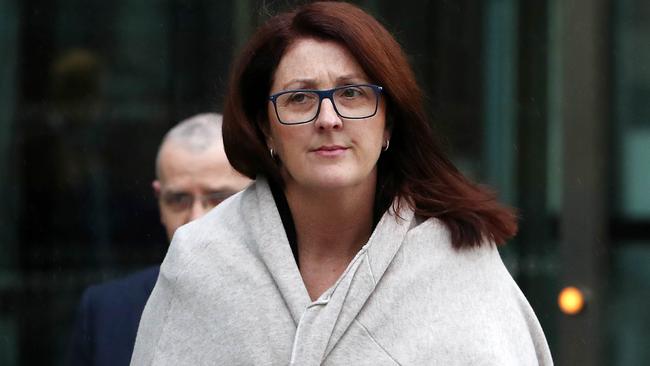Banking royal commission: NAB put on criminal charge alert
The NAB may face criminal charges amid revelations the lender charged fees of more than $3 million to dead people.

National Australia Bank may face criminal charges over a probe by the corporate regulator into the company’s “suspected offending”, amid revelations the lender charged fees of more than $3 million to dead people.
Financial services royal commissioner Kenneth Hayne also raised the prospect that NAB’s taking of money “to which there was no entitlement” for services it never provided might be a criminal offence during an at-times torrid day of hearings yesterday.
The proceedings also laid bare NAB’s unsuccessful attempts to convince the Australian Securities & Investments Commission that it should not have to pay full compensation to customers slugged with fees for which they received no service, and revealed the slow pace at which it moved other clients out of old high-fee funds into a cheaper option, as required by law.
It is believed ASIC’s investigation relates to multiple alleged breaches of corporate laws and the regulator has yet to decide whether to strike a deal with the bank, pursue civil litigation or go for criminal prosecution.
In her second day in the royal commission witness stand, Nicole Smith, the chairwoman of NAB’s super trustee company NULIS, was forced to admit there was an inherent conflict between the for-profit nature of the business and looking after the interests of super fund members.
NULIS has estimated that 4135 members may have been affected by the adviser service fees charged to dead people. They were charged an average of $730, totalling $3.01m. It is believed the fees are no longer being charged and a remediation plan is being developed.
NAB’s graveyard sting emerged a day after ASIC revealed the potential compensation bill that banks would have to pay to victims of the “fee for no service” scandal across the industry could exceed $850m.
Ms Smith, who is set to give further evidence this morning, said the company began looking into whether it had been charging fees from dead customers in May, after the fact that the Commonwealth Bank had been doing so for years was exposed at commission hearings. She said NAB, which ranked as one of the nation’s biggest lenders, told ASIC it had been charging the dead fees in May or June this year.
The commission was also shown a letter from ASIC to NAB, headlined “Outline of suspected offending by the NAB group” relating to 10 entities within the bank involved in a broader “fees for no service” scandal.
Mr Hayne had asked Ms Smith whether she had “any contemplation of a criminal proceeding” against NAB for charging a “plan service fee”, which was supposed to be for general financial advice, to people who did not have a financial planner. “Not at this time, no,” she responded.
Mr Hayne asked: “Did you think … taking money to which there was no entitlement raised a question of the criminal law?”
“I didn’t,” Ms Smith replied.
Counsel assisting the commission, Rowena Orr QC, has previously suggested Mr Hayne should find AMP committed crimes through repeatedly misleading ASIC over its “fee for no service” scandal.
Late yesterday, the NAB succeeded in keeping secret, at least until this morning, parts of the document that might shed more light on ASIC’s continuing probe.
Objecting to the tendering of parts of the letter, counsel for the bank, Neil Young QC, said the material related to ongoing negotiations between NAB and ASIC involving not only how customers would be compensated but also “other aspects of liability or culpability relating to previous conduct, and how those matters might be resolved between ASIC and ourselves”.
Mr Hayne put off until this morning arguments on whether the full ASIC letter should be publicly aired.
Parts of the document revealed so far show that complaints to the NAB from customers who say they paid money but got nothing in return date back to 2009.
Some 40 complaints responded to between 2012 and 2015 resulted in compensation of more than $155,000, ASIC said.
“Client’s son has raised a concern regarding an ongoing service fee of 1.1 per cent on the client’s account for the past 15 years without ongoing service provided to clients,” read one complaint singled out by ASIC.
In another case, “client alleges lack of ongoing service from November 2009 to March 2011”.
Mr Young earned the ire of Mr Hayne by claiming the document was irrelevant to the evidence that would be given by Ms Smith.
“You will not give her her answer, Mr Young. You will not,” Mr Hayne said, pointing his finger at the bank’s counsel. “Do you understand me?”
Mr Young: “I’ve done nothing of the sort, commissioner.”
Commission hearings in April revealed that planners at a CBA subsidiary continued to charge people fees for years after they had died.




To join the conversation, please log in. Don't have an account? Register
Join the conversation, you are commenting as Logout